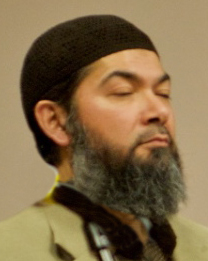Dr. Ali Hazratji is president of the Islamic Society of Western Massachusetts and has lived in the area for decades, working closely with Muslims from Boston to Manhattan to further the cause of Allah.
Newly inspired by 9/11, many other local followers of Mohammad’s sunna, like Dr. Hazratj, the Muslim Brotherhood, or Palestinian Arabs, will be reaching out in the coming decade to teach us more about the Religion of Peace.
10 – 3 – 01 – Anti-war group holds teach-in, prepares for walk-out – Amherst Student
A panel discussion on “Global Terrorism and the Domestic Response” held in the Red Room last Wednesday drew over 120 students and community members to listen to four speakers discuss the potential for a peaceful response to the recent tragedies.
The discussion, hosted by the Amherst Community Outreach program, with support from several Amherst clubs, was the first in a series that is meant to encourage campus dialogue.
“I was pleased to see such strong attendance from the Five-College community,” said Jennifer Cannon, community outreach coordinator for the College. “Among other things, I think students want to learn both the history of the Taliban’s involvement with Afghanistan and why people are so upset with the U.S. around the world.”
Among those in attendance were a significant number of Five-College students, who came to listen to a panel that included Sut Jhally, a professor of communication at the University of Massachusetts and executive director of the Media Education Foundation.
“I really was excited by the question as to why this event happened rather than who perpetrated the crime,” said Jackie Chromey, a freshman at Hampshire College. “I think it’s something that people really need to consider; I want to see more brainstorming of ideas for alternatives for a peaceful response.”
Jhally started the discussion with a speech that focused on the “new perspective” that he asserted must be created. Jhally also indicated that educating the public, especially outside of what he deemed the “closed propaganda system” of the mass media, would be a large part of the solution to the current crisis.
“As someone who comes from the left progressive community, the left needs a new way of thinking about this; a new situation requires new understanding, the old won’t suffice,” Jhally added. “This is a moment when history can be shifted, and we can shift it if we engage in the hard work of education.”
Mohammad Ali Hazratji, president of the Islamic Society of Western Massachusetts, followed Jhally with quotes from the Qur’an that stressed the Islamic view of the sanctity of human life. He went on to give several anecdotes that emphasized the importance of dialogue to prevent hateful reactions against Islamic groups that were not involved in the attacks.
“The Qur’an and God has decreed that whoever kills one innocent person is like one who has killed all of mankind,” said Ali Hazratji. “You must stand up for justice even if it is against your brother, even if it is against yourself. We have to be just.”
The next speaker, Mahsa Khanbabai, a U.S. immigration lawyer, spent most of her speech detailing the legal implications of proposed laws on the U.S. immigrant community.
“If someone has done something to the U.S. that was a danger to security, they can be put on the next plane out of the country, with limited habeas corpus and without judicial review,” said Khanbabai. “This is unconstitutional; this is not right. We must consider if this will be used to indiscriminately target people from certain ethnic backgrounds.”
Professor of Political Science Pavel Machala concluded the discussion with a few words on the importance of asking the question “why?” in regard to the response to terrorism.
“This question of ‘why?’ as opposed to ‘who?’ is uncomfortable and unstable, but we do not have to apologize and worry that we are engaging in moral relativism,” said Machala. “‘Why?’ [is] the only question I believe that will help us understand how to get out of this fear; if we do not ask ‘why?’ we will tell a terrible price in lives.”
A question and answer session following the panel discussion included several personal stories, as audience members reacted to the academic discussion with anecdotal examples of the issues in the “real world.”
One woman who spoke said that she feared that her husband would be forced to leave the country upon the institution of tougher extradition laws. A school teacher related the opposition that parents have exhibited to any discussion they deemed “unpatriotic.”
Several audience members said that they were frustrated with the lack of diversity of the speakers, suggesting that the absence of a conservative viewpoint retarded the potential for a real debate.
“I thought it was a very informative and inspirational display of ideas and action,” said Andrew Doss ’03. “I just thought it should have been a more broad perspective, because we haven’t started a dialogue between liberals and conservatives on the issues, and talking about it will be isolated and unproductive until we do.”
Some audience members responded to the conservative viewpoint, regardless of its absence, challenging militaristic people to make their case for action, rather than solely attacking the movement for a peaceful response.
“I have heard no one come up to me and tell me why military aggression is a correct response to this. People simply say it is the thing to do because something must be done,” said Gautam Bhan ’02. “More than anything, this issue needs to be a debate again.”
Issue 05, Submitted 2001-10-03 16:02:05




